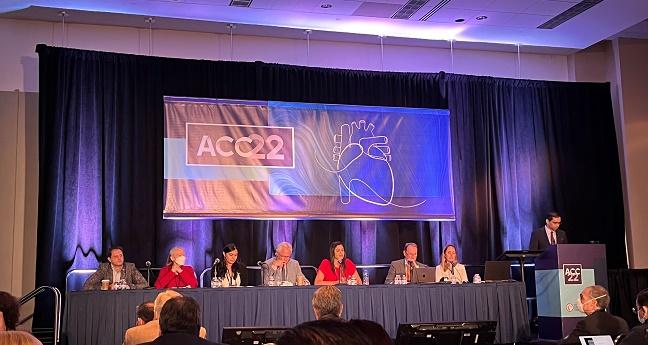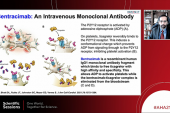Bentracimab Swiftly Reverses Ticagrelor, Platelet-Function Study Affirms
In rare cases, this drug could save a patient’s life, Allen Jeremias says. “From that perspective, I would like to see it on the shelf.”

WASHINGTON, DC—Additional evidence, this time from a phase IIb trial in healthy people ages 50 to 80, supports that bentracimab (PhaseBio) provides a near-immediate reversal of ticagrelor’s antiplatelet effects evaluated using platelet function tests.
The investigational recombinant human monoclonal antibody fragment binds to free ticagrelor and its active metabolite, allowing the drug to be cleared from the bloodstream. The reversal of platelet inhibition has been seen within minutes across studies of bentracimab.
And in this new analysis, there were no thrombotic events or serious adverse events among patients treated with bentracimab, affirming its safety, Deepak Bhatt, MD (Brigham and Women’s Hospital, Boston, MA), reported here at the American College of Cardiology (ACC) 2022 Scientific Session.
“Based on these data, bentracimab appears to be a very promising option for ticagrelor reversal,” he said. “Assessment of bentracimab’s clinical effect on patients with bleeding awaits completion of the REVERSE-IT study.”
Clinical Need
For all antiplatelet agents, there are concerns about spontaneous major bleeding and bleeding associated with urgent or emergent invasive procedures, Bhatt said. But ticagrelor differs from other P2Y12 inhibitors in that it reversibly binds to P2Y12 receptors on platelets, meaning the drug can leave a receptor on one platelet and move to a receptor on a different platelet. For that reason, its effects cannot be reversed with platelet transfusions, because ticagrelor in the bloodstream can bind to the new platelets. Clopidogrel and prasugrel, in contrast, are irreversible inhibitors of the P2Y12 receptor, so their antiplatelet effects can be dampened by giving more platelets.
Thus, Bhatt said, a rapid-acting reversal agent would be useful for ticagrelor-treated patients.
Prior studies of bentracimab have yielded promising results. A phase I study in relatively young, healthy volunteers, presented at ACC 2019, demonstrated rapid and lasting reversal of ticagrelor’s antiplatelet effects with a bolus and prolonged infusion. And an interim analysis of the phase III REVERSE-IT trial, done to support an application for accelerated conditional approval in the United States and Europe, showed that bentracimab safely induced reversal in patients requiring urgent surgery or invasive procedures and those with uncontrolled major or life-threatening bleeding; adjudicated rates of surgical hemostasis were high. A small number of patients had thrombotic events, but they were not deemed related to bentracimab. There were no drug-related serious adverse events or allergic/infusion-related reactions. Enrollment continues.
Based on these data, bentracimab appears to be a very promising option for ticagrelor reversal. Deepak Bhatt
The phase IIb study reported by Bhatt at ACC 2022 included 205 healthy adults ages 50 to 80 (mean age 61 years; 49.8% women) who were pretreated with ticagrelor and aspirin for 48 hours. They were then randomized 3:1 to get bentracimab or placebo, with platelet function measured using the VerifyNow assay and the vasodilator-stimulated phosphoprotein phosphorylation (VASP) assay.
Both of those assays—with VerifyNow providing results in platelet reactivity units (PRU) and the VASP assay providing the platelet reactivity index (PRI)—showed rapid and sustained reversal of ticagrelor with bentracimab, with effects seen within 5 minutes.
The primary endpoint—minimum percent inhibition of PRU within 4 hours—showed a significant advantage for bentracimab over placebo (P < 0.0001). The findings were consistent across subgroups.
The investigators also examined markers of platelet activation—soluble P-selectin and mean platelet volume—to look for a possible rebound effect after the cessation of bentracimab, and there was no evidence of that phenomenon.
There were no differences between groups for treatment-emergent adverse events, and there was only one serious adverse event during the study (a car accident in the placebo group). No drug-related serious adverse events or thrombotic events were seen.
‘An Important Drug’
Binita Shah, MD (NYU Langone Health, New York, NY), commenting on the results during a panel discussion after Bhatt’s presentation, said, “I think this is an important drug to have in our armamentarium given the scope of patients who are now on the potent P2Y12 inhibitors.”
She asked whether there would be an opportunity to better understand the interaction of inflammation and platelet activity in patients with coronary disease who present with a bleeding event (this study did not include individuals with known CAD) and whether it’s possible higher-risk patients would respond differently to bentracimab.
Bhatt said the P-selectin analysis partly addresses the inflammation question, because it is a marker of both platelet activation and inflammation. There was no signal of a rebound effect either in the healthy volunteers in the current study or among the higher-risk patients included in REVERSE-IT.
“We think with bentracimab there’s a safe way of reversing ticagrelor but without causing that sort of rebound or hypercoagulability,” Bhatt said, adding that once ticagrelor is removed from the bloodstream, the protective effect is gone. Therefore, Bhatt said he “wouldn’t be shocked” to see a cluster of thrombotic events around the time ticagrelor-treated patients have the drug stopped due to bleeding or a surgical procedure. “But that’s not the bentracimab that’s doing it. It’s the removal of ticagrelor’s beneficial effect,” he explained.
It’s one of those drugs where in the rare circumstance, it can save somebody’s life. Allen Jeremias
Also commenting on the study for TCTMD, Allen Jeremias, MD (St. Francis Hospital, Roslyn, NY), said it doesn’t make mechanistic sense that there would be a rebound effect because bentracimab targets ticagrelor itself. “If it doesn’t interfere with the platelets, I don’t see how it would cause a prothrombotic effect,” he said.
At this point, there isn’t a safety concern with bentracimab, which would likely be reserved for patients with major GI bleeds, life-threating bleeds, and intracranial hemorrhages, among other types of serious bleeds, if approved, Jeremias said.
And it would fill an important niche, he indicated. “Based on the data that was presented, it seems very, very, very effective in reversing the efficacy of [ticagrelor] within minutes. So obviously that’s positive for somebody who is actively bleeding.”
Bentracimab won’t be a blockbuster, Jeremias said, “but at same time, it’s one of those drugs where in the rare circumstance, it can save somebody’s life. So from that perspective, I would like to see it on the shelf.”
Todd Neale is the Associate News Editor for TCTMD and a Senior Medical Journalist. He got his start in journalism at …
Read Full BioSources
Bhatt DL. Bentracimab immediately and significantly reverses the antiplatelet effects of ticagrelor in older people. Presented at: ACC 2022. April 2, 2022. Washington, DC.
Disclosures
- The study was funded by PhaseBio.
- Bhatt reports receiving research funding or unfunded research support from Abbott, Amarin, Amgen, AstraZeneca, Bayer, Boehringer Ingelheim, Bristol-Myers Squibb, Chiesi, Eisai, Ethicon, Forest Laboratories, Idorsia, Ironwood, Ischemix, Lilly, Medtronic, PhaseBio, Pfizer, Regeneron, Roche, Sanofi, Synaptic, The Medicines Company, FlowCo, Merck, Novo Nordisk, PLx Pharma, and Takeda; being a site co-investigator for Biotronik, Boston Scientific, St. Jude Medical, and Svelte; being a trustee for ACC; serving as an advisory board member, director, or chair for Cardax, Elsevier Practice Update Cardiology, Medscape Cardiology, Regado Biosciences; the Boston VA Research Institute, the Society of Cardiovascular Patient Care, TobeSoft; the American Heart Association Quality Oversight Committee; serving on a range of data safety monitoring committees; receiving honoraria for editorial or committee activities for a range of publications and organizations; and receiving royalties from Elsevier.
- Jeremias reports consulting fees/honoraria from Abbott, ACIST, Boston Scientific, and Volcano.





Comments